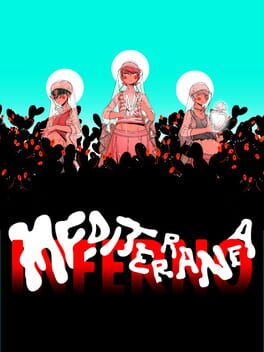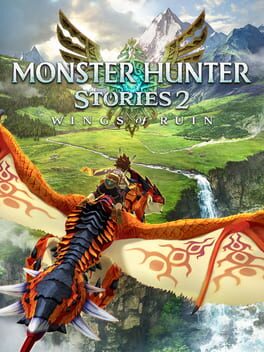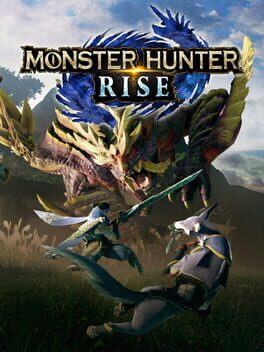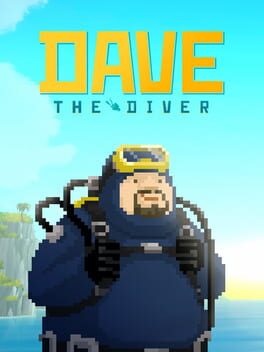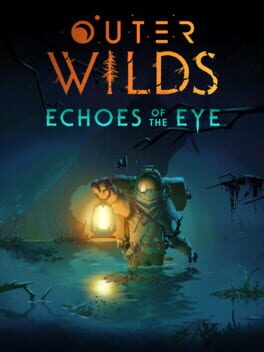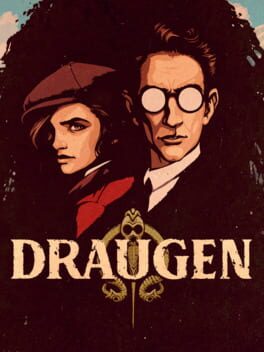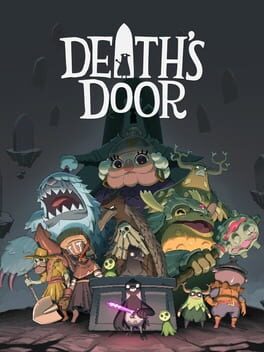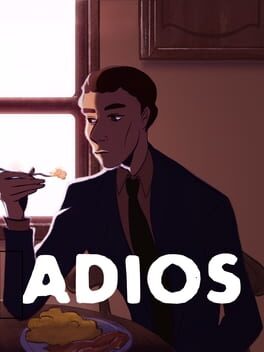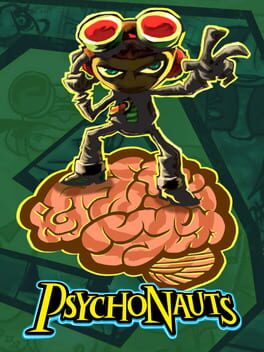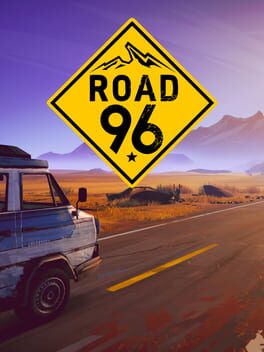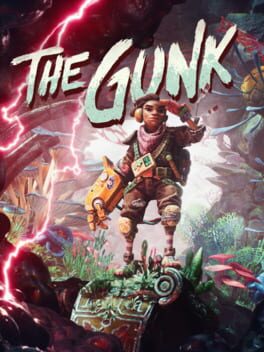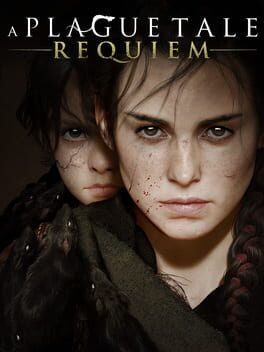2023
Beautiful, angry, raw. This game explores the struggles of queer youth during the pandemic in Italy through an outwardly flamboyant and hedonistic tone both in its aesthetics and narrative, revealing some real anger and frustration boiling underneath the surface. It might not have the most polished writing and themes, but it is worth playing just to experience a confident narrative from a point of view that is fresh and deeply personal.
This would have been my favorite game ever if it came out 10 years ago at the height of both my Pokemon and Monster Hunter obsessions. Today, it is a really good game that suffers from a lack of narrative design ambitions and a resulting super repetitive main gameplay loop that is enhanced by a general slowness of combat, even at 3x speed due to the dedication to transition animations for literally everything.
The monstie system with all that it entails, from hatching eggs to transfering DNA blows Pokemon out of the water and is super addictive to pursue, offering lots of rewards if you decide to put the time in.
The whole presentation and animations are absolutely wonderful and add so much to the experience, same with the expanded combat system that kept me engaged this time around where the first game failed and made me actively feel like the game is supposed to be baby's first JRPG not intended for adults to enjoy. This game feels much more mature and balanced for all audiences, which convinced me to invest my time and see it through, which I don't regret at all, the final boss fight was pretty impressive and if I didn't already take almost two months to finish the story, making me completely burn out on the game, I would happily jump into the post-game stuff which features all the best monsters of course but as it is, I will leave it at that .
The monstie system with all that it entails, from hatching eggs to transfering DNA blows Pokemon out of the water and is super addictive to pursue, offering lots of rewards if you decide to put the time in.
The whole presentation and animations are absolutely wonderful and add so much to the experience, same with the expanded combat system that kept me engaged this time around where the first game failed and made me actively feel like the game is supposed to be baby's first JRPG not intended for adults to enjoy. This game feels much more mature and balanced for all audiences, which convinced me to invest my time and see it through, which I don't regret at all, the final boss fight was pretty impressive and if I didn't already take almost two months to finish the story, making me completely burn out on the game, I would happily jump into the post-game stuff which features all the best monsters of course but as it is, I will leave it at that .
2021
This was a rollercoaster ride for me of being completely in and out of where the game was taking me. There were definite disappointments and downturns regarding onslaughts of new mechanics and the meta story that got me really close to dropping the game, but ultimately I am glad to have seen it through, even if I wish that this was the moody horror card-game/escape room hybrid it is on the box, because these are definitely the best bits of the experience. It has some tricks up its sleeve that still turned it around for me in the end and if you haven't experienced any other game from the developer you will probably quite enjoy the surprises the game has in store for you. If you know what direction I am hinting at a lot won't be as effective anymore, but it is definitely more refined in what it does than many other similar games. If you are at all intrigued by this game, absolutely try it, if nothing else it absolutely entertains in every minute.
2021
This is the most streamlined Monster Hunter yet and one of the best. It combines the DNA of old Monster Hunter, specifically Portable 3rd and World into an efficient, fluid and truly remarkable achievement carving a fascinating way into the future of the franchise. At about 70 hours this is by far the shortest time I have spent with a Monster Hunter game and the lack of a G/Master Rank or tempered monster equivalent to really incentivize the endgame grind is a bit disappointing and the Rampages are interesting but ultimately tedious and repetitive. Still, the variety created through Wirebugs and Switch Skills adds so many interesting layers. In Generations I quickly bounced off the excessive amount of different styles and Hunter Arts, this new system is very similar but actually integrates naturally through the design of the monsters and world around the Wirebug concept, which is important for me to accept such a drastic design iteration. I really hope they manage to supply this game with steady content to solve most of my issues, but the future seems bright for Monster Hunter. We have come a long way since the days of fan translation patches on the PSP, huh.
2022
One of the most fundamentally satisfying combinations of gameplay loops make this feel so effortlessly solid just from reading the basic description that you hunt fish in a tiny roguelite loop during the day to sell them in your sushi restaurant at night. That is a perfect premise already. The presentation, music and steady supply of new systems, upgrades and tons of little gameplay twists and flourishes then elevate this to greatness and most remarkably keep a consistent fresh pacing over the almost 30 hours it unexpectedly took me to complete this, never running out of steam. It struck a similar nerve for me as Cult of the Lamb last year which I was just as hopelessly addicted to, so beware, Dave the Diver will leech your time and you won't even notice it.
2023
I really liked the game up until it decided to throw in a cursed Sen's Fortress/Blighttown crossover section forcing you to do precision platforming with the awful jumping mechanics of Souls games pre Elden Ring while being shot at from a distance. How could anyone think this was a good idea? Did they think people liked the platforming in Souls games?
A great addition to a masterpiece, brimming with new ideas and content of almost a sequel while finding a fascinating spot in the Outer Wilds lore where you didn't think anything was necessary before but are glad that they decided to tell this story. As two packages Echoes of the Eye feels more mechanical, almost Escape Room-like with new knowledge mainly pertaining and pointing to secrets used to progress, while the base game fed off an archeological and explorative drive making connections along the way, which I personally found to just be more interesting for my taste in the end. They feel very distinct, which is really good since Outer Wilds felt pretty complete already.
Oh, and this is a horror game. Boy, they nailed this aspect (apart from a few overwhelming bits in the latter half) and the music, THE MUSIC. Great new tracks and fantastic remixes of iconic old tracks, almost triggering nostalgia already at this point.
This is a necessary play for everyone who liked the base game and is well worth the price, I was worried I would never be able to enjoy something 'Outer Wilds' for the first time again, so I am weirdly emotional that I still got the chance to have a new experience in this universe.
Oh, and this is a horror game. Boy, they nailed this aspect (apart from a few overwhelming bits in the latter half) and the music, THE MUSIC. Great new tracks and fantastic remixes of iconic old tracks, almost triggering nostalgia already at this point.
This is a necessary play for everyone who liked the base game and is well worth the price, I was worried I would never be able to enjoy something 'Outer Wilds' for the first time again, so I am weirdly emotional that I still got the chance to have a new experience in this universe.
2019
2021
I noticed a feeling I have when playing certain games that comes close to 'coziness' or flow. When the movement mechanics are perfectly tuned, the exploration finds the perfect balance for challenge and frequency and the game is polished to the level where you can just let yourself go completely because you are enjoying every step you take. This feeling usually leads me to spend as much time in these games as possible and tedious completionist activities flip to delicious extra juice to squeeze out of the most refreshing fruit. Well, this is certainly one of those games.
Death's Door oozes in polish and uses the third dimension to the full potential in a traditionally flat 2D genre. Style is certainly substance in this case, from fancy cinematography, beautifully layered and detailed dioramas forming a deeply intertwined and intricate level design and world to just hilariously bold title cards rivaling the ones in Control. The balancing act of humor and ernest, heartfelt storytelling works out perfectly in this bleak but intrinsically cheeky setting - you are a soul-reaping crow wielding a glowing sword arriving by bus at an office building greeted by Baul Plart after all.
Something I have to give games the highest credit for is respecting the player's time and dedication. You have an abundance of collectable items to collect and puzzles to solve but you get the option to get hints at various points that don't spoil the solution but relieve the player of needing to backtrack endlessly and should you decide to stick around after the ending and poke a bit more into the game, you will be rewarded for your time not only with a satisfying True Ending but also with great surprises and twists along the way.
Death's Door oozes in polish and uses the third dimension to the full potential in a traditionally flat 2D genre. Style is certainly substance in this case, from fancy cinematography, beautifully layered and detailed dioramas forming a deeply intertwined and intricate level design and world to just hilariously bold title cards rivaling the ones in Control. The balancing act of humor and ernest, heartfelt storytelling works out perfectly in this bleak but intrinsically cheeky setting - you are a soul-reaping crow wielding a glowing sword arriving by bus at an office building greeted by Baul Plart after all.
Something I have to give games the highest credit for is respecting the player's time and dedication. You have an abundance of collectable items to collect and puzzles to solve but you get the option to get hints at various points that don't spoil the solution but relieve the player of needing to backtrack endlessly and should you decide to stick around after the ending and poke a bit more into the game, you will be rewarded for your time not only with a satisfying True Ending but also with great surprises and twists along the way.
2021
The writing and performances are the main focus here and really stand out to deliver a tender and meaningful exploration of guilt and trauma. The gameplay - short, simple activities between walks to different vignette-style settings rarely adds to the experience, mostly due to poor implementation but the achieved sense of place and atmosphere created by the beautiful environment art and lighting really sell the story in a neat package.
2005
A delightful bag full of imagination and creativity that ultimately falls a bit short of greatness for me due to floaty controls and a weird structure that starts as a classic 3D platformer with a hub world and distinct levels but ultimately abandons all that for a semi-linear chain of levels that totally fit the dream-within-dream narrative angle and stand as great levels on their own but ultimately fail to tie it back to an accessible pacing anchor and feeling of progression. I admire the unique approach, there really is nothing like this game, but can't say I fully appreciate the execution, which makes me all the more excited for the long awaited sequel.
2022
What looks like a nostalgia-driven Zelda clone on the surface turns out be so much more than that or rather invokes the nostalgia in more creative ways than you would expect. It calls back on the era of extensive game manuals and obtuse game mechanics and channels the experience of playing imported games in languages you don't understand, which is such a specific but untapped experience that is wonderfully translated into a fully formed puzzle-adventure. It is to many parts a player knowledge based puzzle box of figuring out the possibility space and (mechanical) language of the game more often than not feeling closer to an Outer Wilds, The Witness or Fez than its more obvious surface level Zelda or Dark Souls inspirations.
It isn't perfect, though. Hiding all the basic elements of your game and putting tutorials behind obscure scribbles on manual pages leads to many magical revelations but can easily in turn leave you stumped at what to do or how to interpret something when you don't know what the full possibility space of the game is yet. The more traditional meat of the game, mainly the combat never truly felt as responsive or fun as I wanted and there is an overall clunkyness in interactions with the world through weird perspective issues caused by the isometric camera, annoying inventory management and floaty combat. Nevertheless I would probably universally recommend this game to anyone even remotely interested. The in-game manual and related puzzle mechanics are such cool systems and breath of fresh air that absolutely need to be experienced. Even if you don't have nostalgia for this era of games and the surrounding games culture of reading manuals and importing japanese games, Tunic will make sure that you wish that you experienced that era.
It isn't perfect, though. Hiding all the basic elements of your game and putting tutorials behind obscure scribbles on manual pages leads to many magical revelations but can easily in turn leave you stumped at what to do or how to interpret something when you don't know what the full possibility space of the game is yet. The more traditional meat of the game, mainly the combat never truly felt as responsive or fun as I wanted and there is an overall clunkyness in interactions with the world through weird perspective issues caused by the isometric camera, annoying inventory management and floaty combat. Nevertheless I would probably universally recommend this game to anyone even remotely interested. The in-game manual and related puzzle mechanics are such cool systems and breath of fresh air that absolutely need to be experienced. Even if you don't have nostalgia for this era of games and the surrounding games culture of reading manuals and importing japanese games, Tunic will make sure that you wish that you experienced that era.
2021
Man, this game is so interesting and I am really glad I finally decided to play it on a whim without really knowing what it was about.
The narrative structure is fascinating and generally works incredibly well with the story it tells, stitching together roadtrips with vignettes featuring a distinct cast of characters. These vignettes offer great variety in settings and tones and the narrative puzzle revealed bit by bit through these character moments is genuinely interesting to follow because you never know for sure what you will get with each new vignette. I really can't say enough nice things about the narrative design, structure and gameplay loop of Road 96.
So... why this score?
Well, I didn't talk about the actual contents of the game yet. Road 96 is unabashedly political through every fiber of its narrative. And therein lies the problem. I adore games willing to take on politics and having the guts to stand for something.
The politics of Road 96 are messy and not supported or conveyed by the most amazing writing I have seen around, to be generous. The chosen characters and their roles in the world are certainly diverse and interesting, but it often dips into territories you wouldn't go with as the player, lacking the meaningful application of player agency and the hamfisted parallels to the real world are played for laughs and irony for the most part but can't help but reveal the superficial depth we can expect from its handling of politics. The performances are emotional for sure in key moments, but also really do not stand out as anything but servicable for the most part.
The main issue I had around the narrative problems was the lack of reactivity or guidance from characters and the game on what my decisions mean. Disappointing a staunch anarchist by choosing the moderate dialogue option got me a disappointed one-liner but...okay? There are generally three options you get, 1. everyone for themselves, 2. fuck the system 3. go vote pwease, which seem to accumulate in the background for something...maybe? I am not sure if there are even any consequences to these flavor choices you make, maybe it's so seamless that I didn't notice, but in any case there is just this total lack of bite and reaction to every choice because of this, leaving the player in this ambigous space where they just play along until credits roll.
Maybe, that's just me. It is still absolutely worth it to play this game, I can't emphasize this enough, Road 96 fascinates me to no end and it has a lot going for it, if you are at all on the fence about it, I will absolutely recommend it, at the very least you will find a lot to like, maybe even dismissing my criticisms, in which case this game could be loved by a lot of people, I believe.
The narrative structure is fascinating and generally works incredibly well with the story it tells, stitching together roadtrips with vignettes featuring a distinct cast of characters. These vignettes offer great variety in settings and tones and the narrative puzzle revealed bit by bit through these character moments is genuinely interesting to follow because you never know for sure what you will get with each new vignette. I really can't say enough nice things about the narrative design, structure and gameplay loop of Road 96.
So... why this score?
Well, I didn't talk about the actual contents of the game yet. Road 96 is unabashedly political through every fiber of its narrative. And therein lies the problem. I adore games willing to take on politics and having the guts to stand for something.
The politics of Road 96 are messy and not supported or conveyed by the most amazing writing I have seen around, to be generous. The chosen characters and their roles in the world are certainly diverse and interesting, but it often dips into territories you wouldn't go with as the player, lacking the meaningful application of player agency and the hamfisted parallels to the real world are played for laughs and irony for the most part but can't help but reveal the superficial depth we can expect from its handling of politics. The performances are emotional for sure in key moments, but also really do not stand out as anything but servicable for the most part.
The main issue I had around the narrative problems was the lack of reactivity or guidance from characters and the game on what my decisions mean. Disappointing a staunch anarchist by choosing the moderate dialogue option got me a disappointed one-liner but...okay? There are generally three options you get, 1. everyone for themselves, 2. fuck the system 3. go vote pwease, which seem to accumulate in the background for something...maybe? I am not sure if there are even any consequences to these flavor choices you make, maybe it's so seamless that I didn't notice, but in any case there is just this total lack of bite and reaction to every choice because of this, leaving the player in this ambigous space where they just play along until credits roll.
Maybe, that's just me. It is still absolutely worth it to play this game, I can't emphasize this enough, Road 96 fascinates me to no end and it has a lot going for it, if you are at all on the fence about it, I will absolutely recommend it, at the very least you will find a lot to like, maybe even dismissing my criticisms, in which case this game could be loved by a lot of people, I believe.
2021
The Gunk is pretty enjoyable for what it is, even if what it is is nothing too flashy. The game feels pretty good to roam around in, even if the core mechanics run out of steam pretty quickly. The removal of the titular gunk feels decently satisfying the first few times, but then gets tedious and borderline painful to squeeze the triggers for extended periods of time.
The Gunk feels fallen out of the PS2 or even PS3/360 era where there were tons of 3D adventure games that got lost in the shuffle but resonate with people that decided to give them a chance, maybe as one of their first games growing up or due to an appealing cover artwork. I have a soft spot for these kinds of games and grew up playing them, so I can't help but feel fondness for what The Gunk ended up being. It is small, it is unambitious, but at the same time there is something precious to it.
The music is one aspect that definitely stands out as really good and so does the environment art with the transitions from corrupted to lush floral meadows and interesting overgrown ruins. It is nothing you haven't seen before, but will no doubt resonate with people in the right spot for it in their lives. The perfect Game Pass game in that sense and I hope this will be someones first adventure game that they will too have fond memories for in the future while nobody around them will have heard of it.
The Gunk feels fallen out of the PS2 or even PS3/360 era where there were tons of 3D adventure games that got lost in the shuffle but resonate with people that decided to give them a chance, maybe as one of their first games growing up or due to an appealing cover artwork. I have a soft spot for these kinds of games and grew up playing them, so I can't help but feel fondness for what The Gunk ended up being. It is small, it is unambitious, but at the same time there is something precious to it.
The music is one aspect that definitely stands out as really good and so does the environment art with the transitions from corrupted to lush floral meadows and interesting overgrown ruins. It is nothing you haven't seen before, but will no doubt resonate with people in the right spot for it in their lives. The perfect Game Pass game in that sense and I hope this will be someones first adventure game that they will too have fond memories for in the future while nobody around them will have heard of it.
Requiem plays it safe as far as sequels go and continues right where the first game left of. Even if it features more sprawling and detailed environments, it is the type of sequel where I won't remember in a years time what was part of the first game and what was the second game. This isn't a bad thing at all, ultimately I also enjoyed it about equally as Innocence, even if it has nice improvements in combat and character variety.
Where I would have wished for more refinement are the puzzles and some of the rat sections. It happened multiple times that a puzzle or general progression hinged on me noticing an interaction circle somewhere or not missing a crucial piece of dialog that is not repeated, leading to me banging my head against the wall in trial-and-error, not seeing the specific solution to a problem the game wants me to see to progress.
The rats are the bread and butter of A Plague Tale and offer a great twist on stealth mechanics. The tech is honestly impressive, but unfortunately not waterproof. The organic nature of the rat system often led to infuriating frustration where some rogue rats would still be on a cleared path, killing Amecia, you being centimeters away from a light source still dying trying to make one step forward or rats being on a path they are not supposed to be due to some mechanics I won't spoil, leading to the need for wasting a fire pot to clear a tiny patch of rats, alerting all the enemies. These were minor frustrations but were what ultimately held me back from enjoying it more than Innocence.
In the end though, A Plague Tale is incredibly easy to recommend, which hasn't changed with Requiem, offering a tight narrative with impressive set-pieces and digestable stealth gameplay, even I, a person with very very limited patience for any stealth in games, could arrange myself with. It's the little AA sibling of Uncharted and The Last of Us and is just as enjoyable, even if obviously not as refined.
Where I would have wished for more refinement are the puzzles and some of the rat sections. It happened multiple times that a puzzle or general progression hinged on me noticing an interaction circle somewhere or not missing a crucial piece of dialog that is not repeated, leading to me banging my head against the wall in trial-and-error, not seeing the specific solution to a problem the game wants me to see to progress.
The rats are the bread and butter of A Plague Tale and offer a great twist on stealth mechanics. The tech is honestly impressive, but unfortunately not waterproof. The organic nature of the rat system often led to infuriating frustration where some rogue rats would still be on a cleared path, killing Amecia, you being centimeters away from a light source still dying trying to make one step forward or rats being on a path they are not supposed to be due to some mechanics I won't spoil, leading to the need for wasting a fire pot to clear a tiny patch of rats, alerting all the enemies. These were minor frustrations but were what ultimately held me back from enjoying it more than Innocence.
In the end though, A Plague Tale is incredibly easy to recommend, which hasn't changed with Requiem, offering a tight narrative with impressive set-pieces and digestable stealth gameplay, even I, a person with very very limited patience for any stealth in games, could arrange myself with. It's the little AA sibling of Uncharted and The Last of Us and is just as enjoyable, even if obviously not as refined.
